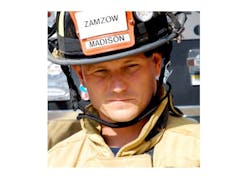Health & Wellness: 10 Habits for Creating Resilience
Resilience might seem like a buzzword that people toss around without much thought, but in our line of work, it’s as real and vital as the air tank that’s on our back. In common terms, resilience is about being like one of those inflatable punching bags: No matter how often it gets knocked over, it springs back up. For firefighters, it isn’t just about springing back up; it’s about how we spring back and keeping our head in the game while we sort out the mess.
Firefighting isn’t a normal job. It throws at us the kinds of challenges where the stakes are life and death, with relentless pressure that doesn’t let up just because our shift ends. Our body and mind are pushed to the limit, and this is where resilience comes in. It’s that deep-down grit that allows us to face intense heat, the roar of a blaze and the heartache of loss and still show up for the next call ready to go. It’s our psychological armor that defends against the burnout, trauma and stress that can make a difficult job even more difficult.
Why resilience matters
Resilience often is misidentified as a trait that some people are born with, a sort of inbuilt toughness. However, resilience entails more than the ability to endure hardship. It’s a dynamic process of positive adaptation in the face of adversity. For firefighters, it means the capacity to recover swiftly from the difficulties that are faced in the line of duty, whether they are physical dangers, psychological stressors or emotional toll.
This adaptability isn’t inherent; it is nurtured. It involves personal habits, social support and proactive strategies that allow firefighters to maintain their effectiveness and well-being in demanding situations. Thus, resilience is essential for firefighters. It lessens the risk of burnout, reduces the incidence of post-traumatic stress disorder and improves overall life satisfaction.
The importance of building resilience ripples across our professional and personal lives. We must realize that it’s an acquired skill that can be cultivated, just as pulling a hoseline and assessing a patient can be.
Building resilience
Building resilience is similar to preparing for a physical event. It’s about developing and reinforcing daily habits that contribute to that strength. As first responders, we must commit to practices that enhance our capacity to weather the strenuous demands of our roles.
Here are the key habits to cultivate that foundational resilience that’s crucial for our profession.
- Physical fitness: This is basic. Keeping in peak physical condition is a no-brainer. Regular, functional exercise keeps our body ready to tackle whatever comes our way and is a stellar way to burn off stress.
- Eating right: We need fuel for our engine, and I’m not talking about donuts in the kitchen. Healthful food gives us the energy and nutrients to keep going strong. It’s important to note that sugars and high-glycemic foods can add stress and fuel disease, thus making nutrition twice as valuable.
- Getting good sleep: Did you ever try to function on just a few hours of sleep? It doesn’t work well in the station or on scene. Solid rest is our recovery time, the span when our body and brain repair and refresh. Sleep also allows our brain to recover from the stress and trauma that we encounter. This can be difficult for us to focus on, with our unpredictable calls and schedules, but the good news is sleep is a skill and can be improved with dedication. Build resilience by working on sleep quality, and try to make it a habit to power down consistently.
- Sharpening our mind: Mental resilience needs training, too. Meditation, mindfulness and other such skills aren’t just for yogis. They help us to stay calm and clear-headed when everything’s falling apart around us.
- Talking it out: We’re firefighters; we aren’t made of stone. After a rough call, we must talk about what’s buzzing in our head, whether it’s with a buddy, a trusted family member or a professional. Getting it out helps us process and move on.
- Building camaraderie: The bond that’s between firefighters is unique. It must be. We rely on each other for our lives. So, investing time in your team, both on and off the job, isn’t just a social nicety. It’s beneficial for building resilience. Focus on having attentive conversations, put the phones away during meals and go back to the old-school ways of entertainment—aka telling stories.
- Never stop learning: The day that we believe that we know it all is the day that we should hang up our helmet. There always is a new skill to master, a new technique to learn and a new danger to research. Staying engaged and being continual learners add to our toolbox for tackling adversity.
- Finding purpose: This one feels natural for us as first responders. We do what we do because we want to make a difference. Reminding ourselves of that purpose, particularly in the difficult times, fuels our inner strength.
- Branching out: Our life can’t be all about the fire department and our crew. Hobbies and interests outside of the firehouse give us a necessary break. These are relief valves for stress and can add happiness to our life. If you don’t have a hobby, maybe it’s time to find one.
- Practicing optimism: Now, I’m not talking about painting everything with a sunny glow. Optimism fosters positive anticipation for future outcomes, reinforcing mental endurance when facing adversity and, thereby, building resilience. Gratitude shifts focus away from harrowing aspects of the job to the rewards and support that’s available, strengthening emotional stability and resilience under pressure. Together, optimism and gratitude create a powerful psychological buffer against stress. If you find yourself in a dark and negative conversation, stop and think of a way to turn the mood around. Fostering a more positive and grateful attitude does wonders for your self-worth and helps to build a more stress-free environment.
Commitment
Resilience isn’t created easily. It’s carved out of habits: daily routines, attitudes and bonds with each other. It’s crafted through sweat, sometimes blood and the willingness to get back on the truck every time.
Embracing resilience isn’t just a personal endeavor. It’s a collective charge, a rallying cry for every member to champion. Devote time to actively promote and practice resilience-building habits every day. Challenge those around you to do the same.
First Responder Resilience Challenge
Are you seeking to cultivate habits that boost your resilience? Dive into the Resilient 50. It’s a 50-day challenge that’s crafted particularly for first responders. The goal of the challenge is to nurture your resilience, pushing you to adopt key habits that will enhance your performance on and off the fire/rescue scene. This free challenge offers fitness regimens, nutrition guidance, mental wellness tools and daily doses of inspiration.
You can sign up at FireRescueFitness.com/Resilient50.
About the Author
Aaron Zamzow
Aaron Zamzow is a firefighter/training officer for Madison, WI, Fire Department. He holds a bachelor’s degree in health/wellness and has 20 years of experience as a fitness trainer. He created Fire Rescue Fitness and authors programs that are aimed at getting fire rescue athletes fit for duty.

